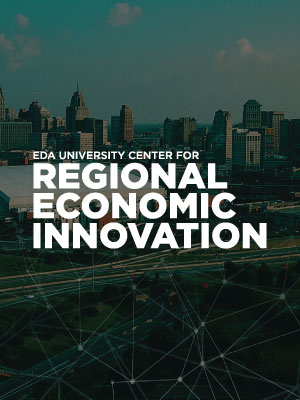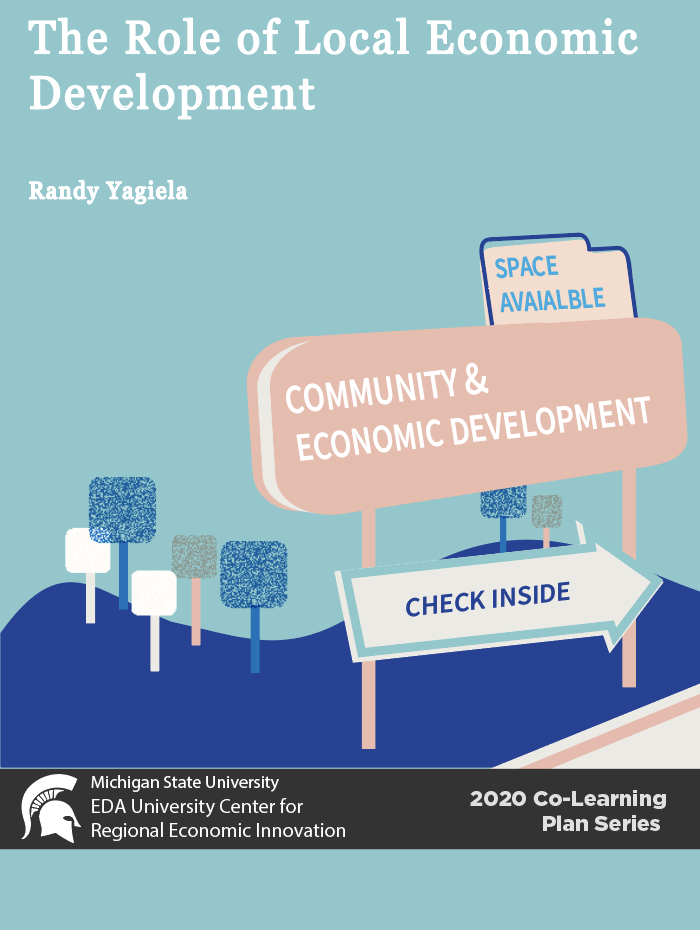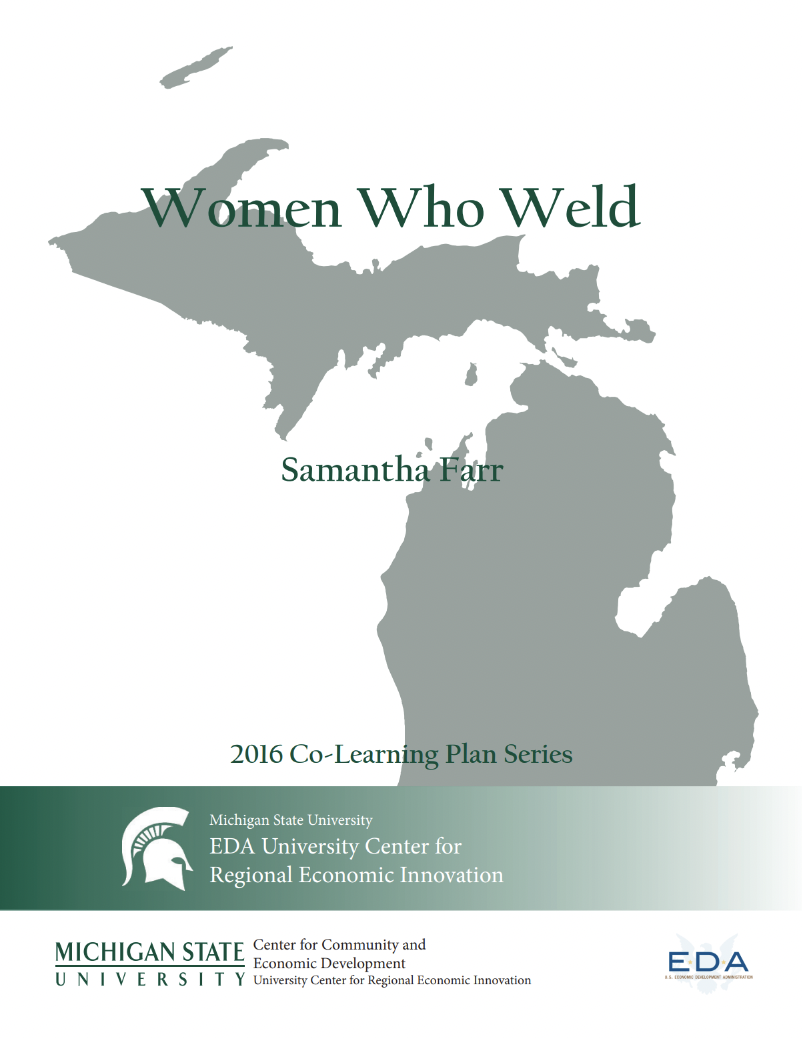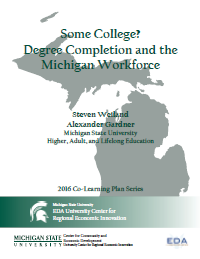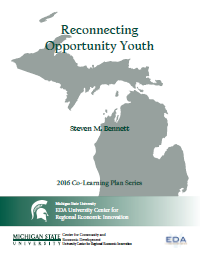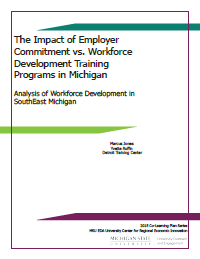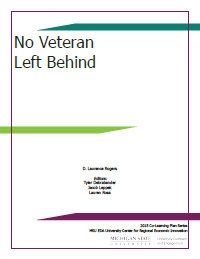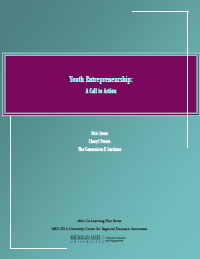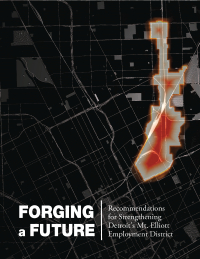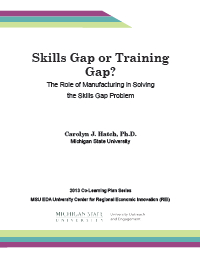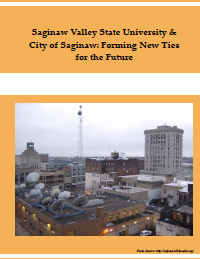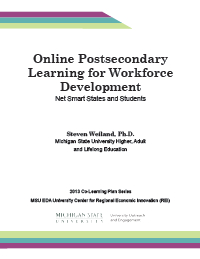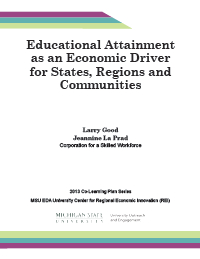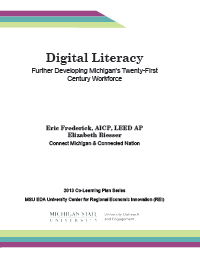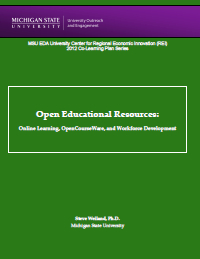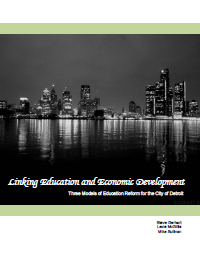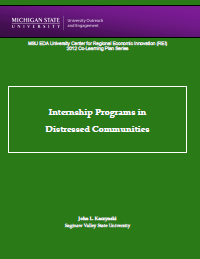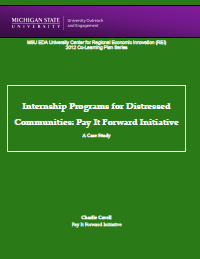Discovering and applying new and innovative economic development tools, models, policies, and programs
Creating Jobs and Wealth in Distressed Michigan Communities
Workforce and Education
-
2024: The Align Center for Workforce Development
Authors: Randy A. YagielaAbout the ProjectThe Align Center aims to offer financial empowerment and training programs in a shared space for various organizations, but also fosters a collaborative culture focused on unified client pathways and employer-centric workforce certification. The project's goals are to create a unified resource center that addresses the gap in workforce training and local career development, especially for nontraditional clients overlooked by existing resources like MI Works. The leadership team, with a deep understanding of the intertwining of housing, transportation, and community needs, brings a holistic approach to workforce development. The project's economic impact is expected to be significant, with plans for a specialized campus catering to employer-specific skill needs, thereby generating living-wage jobs and attracting public/private investments. In summary, the Align Center project represents a comprehensive effort to revitalize a struggling community by integrating education, training, and economic development, with a focus on creating sustainable and equitable opportunities for the residents of Adrian and Lenawee County.
-
2024: International Center of Greater Flint and the Global Flint Initiative
Authors: Adil Mohammed and Phyllis SykesRead the Report About the ProjectThe International Center of Greater Flint (ICGF) CLP proposes to develop a community grassroots outreach process to create a strategic vision and implementation plan for a Global Flint Initiative (GFI). GFI is an economic and community revitalization strategy that focuses on attracting and retaining international talent by becoming a Welcoming Community. The proposed needs assessment will involve an extensive immigrant groups outreach to conduct focus groups, interviews and surveys throughout the region over several months. The goal is to collect data to document the true assessment of this population. In addition to reaching out to the immigrant population, the same method will be implemented with Flint’s native population. This initiative plans to foster a welcoming environment for international talent in Flint, engaging immigrant groups and native residents to build a cohesive and economically resilient community.
-
2023: Making Ends Meet: Women's Work, the Care Sector and Regional Informal Economies: Detroit
Authors: Dr. Louise Jezierski, Dr. Das Gupta, Dr. Linda SayedRead the Report About the ProjectThis Co-Learning Plan examines how women workers and employers navigate the informal care and personal service sectors of the Detroit metropolitan region, focusing on immigrant and adjacent neighborhoods. The 2020 COVID-19 pandemic-based economic crisis has impacted women with layoffs in service sector jobs or leaving to meet family care needs. Women engage the labor market informally through social networks and “brokerage institutions” including neighborhood institutions, e.g. temples, churches, and schools, to find work and household services. The research design employs mixed methodologies - archival data analysis and in-depth interviews - to map connective networks between formal and informal work that sustains a circular economy in greater Detroit.
-
2023: Benefits of Worker-Owned Cooperative Business Development for Low-Income Residents in Michigan
Authors: Margo DalalRead the Report About the ProjectIntroducing incentive and support programs for worker ownership in Michigan can preserve local jobs as business owners retire and increase wealth-building opportunities in low-income communities statewide. Although there is ample research to support the economic and social benefits of work ownership, more research is needed on the public perception of worker ownership from both business owners and employees and small business technical assistance providers to create successful state and city worker ownership initiatives. This Innovation Fellowship will leverage the Detroit Community Wealth Fund as the state’s only loan fund that finances democratically owned and operated cooperative businesses and the only cooperative business incubator.
-
2021: WUPPDR Attraction and Retention of Remote Workers
Authors: Abdulla Alzaabi, Jake Desrosiers, Steve Hemgesberg, Kelsie Martin, and Sax MorganAbout the ProjectAs part of the 2021 Michigan State Practicum course, this project was completed by undergraduate and graduate students in the Urban and Regional Planning degree program. The Remote Working team worked in partnership with Jerry Wuorenmaa of the Western Upper Peninsula Planning and Development Region Commission to develop an initial strategy to attract remote workers to the Western Upper Peninsula region, and suggest a variety of non-monetary incentives to retain the residential workers within the Western UP. The team based their report on primary data that they collected in order to understand the current local demographics as well as the economic status in the given counties. This data plays a role in understanding which counties have felt the largest effect from the remote work transition stemming from the COVID-19 pandemic, and which counties have the most potential to grow. Using the collected data, the team developed strategies that the counties may initiate in order to attract outside residents to the region as well as promote and expand the accessibility of remote work.
Primary research findings included some important trends in demographics and amenities. The population has been steadily declining in the study area for decades and there is very little diversity. Vacant housing stock exists to accommodate remote workers; however, it may be seasonal in nature or generally not be located or designed appropriately to meet demand. The natural resources and the scenic beauty of the area is its greatest asset, but the area is also remote and many parts of the region lack adequate internet connectivity that is necessary for remote work and many other aspects of modern life.
These strategies stemmed from a collection of case studies illustrating successful remote attraction plans implemented by other rural areas and regions with challenges similar to those of the Upper Peninsula. Case studies included West Virginia Remote Worker Program introducing the Outdoor Economic Development Collaborative (OEDC) created to leverage the state’s outdoor recreation assets and stimulate economic opportunities by engaging the youth in outdoor programs and investing in STEM education. By building alliances with educators, state and local government, and the outdoor industry enthusiasts, the region can further define itself as enhancing the environmental quality and the quality of life for citizens. Bakersville, North Carolina was another case study introduced representing a small mountain community tucked beneath Roan Mountain. Bakersville over the past ten years was challenged by drastic job loss due to their mining industry becoming obsolete. As a result, civic leaders came together to form the Bakersville Improvement Group, with a plan to use arts and culture as a means of improving Bakersville’s downtown corridor. This plan included a new annual Rhododendron Festival as well as partnerships with Handmade in America, the National Forest Service, the National Endowment for the Arts, and the N.C. Fish and Wildlife Commission. Partnerships resulted in the construction of a one-mile paved walkway introducing catch and release trout fishing and includes handicap-accessible fishing platforms. The creek walk evolved into what became the first stage of a long-term plan to create parks, playgrounds, multi-use sports fields, and a gymnasium for the town of Bakersville. An incentive focused program that is presented as a case study is from Utah State University offering a remote work certificate as a method to help equip rural residents transitioning to remote work and seeking remote employment opportunities. Utah State University gives relevant educational experiences connecting people to modern employment opportunities and develops innovative solutions for community needs. The online initiative educates, coaches, and mentors the rural workforce. The Remote Work Certificate has shown to help reduce post highschool relocation and provide students with the knowledge, and attitude necessary to seek remote work opportunities.
With one of the largest assets off the UP being nature’s beautiful scenery and wildlife we recommend promoting the lifestyle to would-be remote workers using a punch card/passport to challenge and intrigue participants. This will take them all over the region exploring and discovering the true “UP experience”-, and claiming awards along the way as hiking paths, scenic views, and community festivals are checked off the list. This generates incentives to a targeted demographic to explore some of the region's greatest assets.
With remote work becoming an economic focus the lack of internet bandwidth within certain regions creates barriers for job markets and remote workers looking to the UP as a remote work option. After analyzing the data and researching available opportunities, we recommend municipal networking. This network would be locally funded and provided by the government giving everyone within this range affordable high speed internet. When counties create their own internet and broadband, customers will ultimately get faster internet speeds, lower prices, and better customer service.
While adjusting to these changes in the community it is important to advertise and promote migration through multiple means including social media. Utilizing a central platform to target your intended demographics by promoting events, internet progression, festivals, and economic opportunity can reach a lot of would-be residents. Highlighting newcomers through blogs and vlogs, and having them share experiences about these events, or discuss comparisons between their former home and life in the Upper Peninsula may help others to seek. Building a local brand and promoting the area’s low-cost, high-quality lifestyle together with improving internet access and educational and technical support for the remote workers are the report’s primary recommendations.
-
2021: Making Ends Meet: Women’s Social Capital Development in Regional Informal Economies
Authors: Dr. Louise A. Jezierski and Dr. Sejuti Das GuptaRead the Report About the ProjectThe project examines how women workers and employers navigate the informal sector of Michigan’s economy. The 2020 COVID-19 pandemic and economic crisis has impacted women especially, with layoffs in service sector jobs and women leaving the labor force to care for children. Women engage the labor market through social networks and “brokerage institutions” such as churches, schools, gyms, neighborhoods, to find household service workers and to find work. The research design employs mixed methodologies - archival data analysis and in-depth interviews - to map and model supply chains and networks in the connections between formal and informal work in Lansing’s regional informal economy.
-
2020: The Role of Local Economic Development Agencies
Authors: Randy YagielaAbout the ProjectThe talent disruption experienced by local communities is the number one economic development challenge of our time. Some of the causes of the disruption include a steady decline of the birth rate since 1957, rising boomer retirement rates predicted to grow until 2034, and substance abuse rates devastating the workplace and home. Others cite different contributing causes including low state levels of certifications in skills, a lack of vocational ladders, employees’ work ethic, and a lack of old school human resource departments that focused more on career development. This project was to share talent pipeline strategies with other Michigan communities, and learn from them, with a goal of understanding what it takes to build a sustainable, local talent system. This project demonstrated how local economic development agencies can lead on partnerships with k-12 schools, colleges, employers, and other community stakeholders to solve their talent disruption. The work is rooted in the belief that interdependence, the sharing of not just operational but strategic outcomes, is critical to building sustainable change.
Local economic development agencies sit exactly in a position between employers who demand skills and educational suppliers who deliver education and training to our workforce and students. Local economic agencies are neutral parties who can induce a new connective and unified strategy. Sharing the information on how to build this unification reduces the learning curves for all Michigan communities. -
2020: Northern Michigan University Marquette Area Cost of Living Tool Development
Authors: Ryan Soucy, Carol Johnson, and James VanderboschAbout the ProjectThe Upper Peninsula is a unique place with unique challenges. Talent attraction and retention has long been one of the more prominent challenges. This project started by reviewing current literature on talent attraction efforts, gathered cost of living data in the Marquette, and later, put into a usable tool analyzing the cost of living comparative to other locations around the country. Working with Central Upper Peninsula Planning and Development (CUPPAD) and its regional partners, a graduate student at Northern Michigan University engaged in data collection with C2ER’s Cost of Living Index (COLI) in the Negaunee-Ishpeming area, as well as Marquette. By the end of the project, students were given an opportunity to provide further recommendations for talent attraction strategies and helpful actions considered by CUPPAD and partners.
-
2020: Labor & Community Equitable Development Agenda
Authors: Sam ButlerRead the Report About the ProjectThe proposed action plan includes four primary projects designed to infuse more community benefits into Detroit development practice:
- Advocating for Detroit to adopt an incentive zoning policy
- Encouraging Detroit to adopt stronger engagement and noticing requirements for developments
- Establishing equitable development standards for publicly-owned land
- Collaborating to negotiate a community benefits agreement for a large-scale project
- Collaborating to support the Access for All program, designed to train more Detroiters and people of color to enter the construction trades
- Collaborating to reach mutual understanding about how to revamp Detroit’s Community Benefits Ordinance
-
2017: Women Who Weld
Authors: Samantha Farr, Women Who WeldAbout the ProjectSamantha Farr, Founder and Instructor to Women Who Weld, will be leading this Innovation Fellowship. Women Who Weld is a 501(c)(3) nonprofit, based in Detroit, that teaches unemployed and underemployed women how to weld and find employment in the welding industry. Women Who Weld's 6-week welding program is funded through donations and grants and is subsidized for participants. Women Who Weld was founded in 2014 and hosted two workshops; graduating 8 women and helping them find employment. Samantha Farr intends to create a nationwide or international network of female welders, creating a network can offer support and advice for women in the welding industry or those looking to break into it.
Project Updated As Of September 30th, 2017
-
2016: Women Who Weld, Part II
Authors: Samantha Farr, Women Who WeldRead the Report About the ProjectAccess to free or low-cost training programs that teach people skills needed for jobs that offer sustainable wages is critical for both human and economic development in Detroit. Farr provided free training in welding, career development, and communication skills, and hired a co-instructor, Ralph Taylor, to assist with training in Women Who Weld’s second round of funding. Farr developed a curriculum and replicable framework for an intensive welding training program that produced a direct economic benefit to the community. Please reference Women Who Weld’s Program Overview for information on the problems facing the welding industry, Women Who Weld’s solutions to addressing these problems, and the results of their efforts in and around Detroit.
In 2014 Samantha Farr began a student-led, faculty-guided project to initiate a welding program for homeless, unemployed or underemployed women living in Detroit. Today Women Who Weld offers a subsidized 6-Week Intensive Welding Training Program to teach MIG welding and how to operate various metalworking tools and machines.
In 2016 Ms. Farr developed a Co-Learning Plan to share the Women Who Weld program with the REI Network as of today has secured employment in the welding industry for over 100 women. In 2017, REI staff and the CP designated Ms. Farr an Innovation Fellow which allowed her to expand her program and take it on the road to other states, including California. In late 2017 Ms. Farr and Ms. Bruen earned the University Economic Development Association (UEDA) Award of Excellence for Best Talent Development Program.Samantha Farr and Women Who Weld was featured in InStyle's article, "The Badass 50: Meet the Women Who Are Changing the World."
-
2016: Some College?: A Guide to Online Degree Completion for the Michigan Workforce
Authors: Steven Weiland & Alexander C. Gardner, Michigan State UniversityRead the Report About the ProjectOver 22% of the Michigan workforce has "some college" but no degree. With the rapid increase of jobs requiring a post-secondary degree, creating programs that encourage the completion of a degree has the potential to improve workplace performance, career development, and the state's economy. The goal of this Co-Learning Plan promoted online adult learning for the Michigan workforce. While building upon current federal and state policy, or changes in the law and how agencies of government operate, Weiland & Gardner offered a complementary approach focusing on practice, or guiding individuals toward degree completion and productive and satisfying careers.
Project Updated As Of September 30th, 2016
-
2016: Connecting Leading Edge Talent Development Strategies with Opportunity Youth
Authors: Steve Bennett, Humanity 2.0Read the Report About the ProjectOpportunity Youth, or individuals aged 16-24 who are disconnected from both mainstream employment and a formal education setting, face obstacles that exceed the traditional dynamics associated with unemployment. In this Co-Learning Plan, the author examined the intersection of Evidence-Based Selection Processes (EBSP) with the Opportunity Youth. When done right, EBSP can help improve key metrics that all employers care about, including time-to-hire, retention, productivity, and diversity metrics. EBSP also helps reduce both overt and covert bias that is built into human resource processes by relying on more objective analysis for hiring decisions. The final product was written as a handbook to align young untapped talent with current existing job openings as a means to drive local economic development.
Project Updated As Of September 30th, 2016
-
2015: The Impact of Employer Commitment vs. Workforce Development Training Programs in Michigan
Authors: Marcus Jones, Detroit Training CenterRead the Report About the ProjectWorkforce Development is an important component in Economic Development and a primary focus for Michigan's political leaders. Determining success rates of various workforce Development models is incredibly important in properly spending on workforce programs. The Detroit Training Center investigated the variable success rates of employer -led and non-employer led training programs in Southeast Michigan. This Co-Learning Plan specifically addressed student enrollment, attendance, tardiness and successful completion of training programs. It examined the job placement and the retention rate of employer led training programs compared to the rate of non-employer led training programs.
Project Updated As Of September 30th, 2015
-
2015: No Veteran Left Behind
Authors: D. Laurence RogersRead the Report About the ProjectThis Co-Learning Plan analyzed the demographics of returning veterans and military retirees, the range of skills these vets possess and the most common obstacles they will encounter. A list of programs serving veterans by state, including financing, training, assistance, etc. was compiled. Lastly, success stories of veterans who have overcome obstacles to find new niches for themselves were used to document and recommend best practices for helping veterans re-enter the workforce.
Project Updated As Of September 30th, 2015
-
2014: Youth Entrepreneurship - A Call to Action
Authors: Cheryl Peters & Ocie Irons, Generation E InstituteRead the Report About the ProjectThis Co-Learning Plan discusses how to implement the Generation E model, a five step approach to developing youth entrepreneurship education in your community. Research was done to discover the regions that have the best climate for youth entrepreneurial development and programs will begin shortly after discovery.
Project Updated As Of September 30th, 2014
-
2014: Women Who Weld
Authors: Samantha FarrAbout the ProjectWomen Who Weld, Detroit, MI. This project focused on further developing Women Who Weld, a program designed to teach women how to weld. Samantha Farr, the founder and lead instructor, recruited two women from COTS, the Coalition on Temporary Shelter, and spent a week teaching the two participants the basics of MIG welding. Farr and the participants fabricated a bus bench that is now in use on the Fenkell bus route (at Fenkell and W Parkway) in the Brightmoor section of northwest Detroit.
Samantha Farr and Women Who Weld was featured in InStyle's article, "The Badass 50: Meet the Women Who Are Changing the World."
-
2014: Forging a Future: Recommendations for Strengthening Detroit's Mt. Elliott Employment District
Authors: Aly Andrews, Aja Bonner, James Carpenter, Cassie DeWitt, Colin Dillon, Myles Hamby, Dustin Hodge, Evan Johnson, Kevin Shelton, Brian Smyser, Allison Sponseller, Liz Treutel, Cheng Wang, Dr. June Manning Thomas, Eric Dueweke, University of Michigan Taubman CollegeRead the Report About the ProjectThis project focused on real estate, business development, and community engagement/workforce development related to this specific Mt. Elliott industrial area, honing in on certain specific site or nodes within this expanse. Mt. Elliott includes the GM Poletown plan and many other industrial firms located in the city of Detroit.
Project Updated As Of September 30th, 2014
-
2013: Skills Gap or Training Gap? The Role of Manufacturers in Solving the Skills-Gap Problem
Authors: Carolyn Hatch, Michigan State UniversityRead the Report About the ProjectThis research focuses on the skills gap in the Michigan manufacturing sector, with an emphasis on how producer firms can play a role to address workforce development obstacles by collaborating with institutions and actors in their local supply chains and industrial clusters.
Project Updated As Of September 30th, 2013
-
2013: Saginaw Valley State University and City of Saginaw: Forming New Ties for the Future
Authors: Dylan Hellus, Jeremy Killion, Trent Varva, John L. Kaczynski, Saginaw Valley State UniversityRead the Report About the ProjectThis proposed study examined community service outreach centers (or programs) that are hosted by institutes of higher education in the distressed communities of Detroit, Michigan; Flint, Michigan and Grand Rapids, Michigan. The study will outline the current community based outreach programs sponsored by Saginaw Valley State University and coordinated with the City of Saginaw, Michigan. The study will examine the best practices for the development of a community-university service center in Downtown Saginaw.
Project Updated As Of September 30th, 2013
-
2013: Online Postsecondary Education for Workforce Development: Net Smart States and Students
Authors: Steve Weiland, Ph.D., Michigan State University Higher, Adult and Lifelong EducationRead the Report About the ProjectFollowing up on 2012's Co-Learning Plan, this project built on previous research to develop the concept of "online academic abilities" and how states contribute to such an objective.
Project Updated As Of September 30th, 2013
-
2013: Educational Attainment as an Economic Driver for States, Regions, and Communities
Authors: Larry Good & Jeannine M. La Prad, Corporation for a Skilled WorkforceRead the Report About the ProjectThis research built on national educational attainment and economic growth research and offers an analysis of Michigan efforts to promote investments in education and training that leads to sub-baccalaureate credentials tied to business and industry needs. It included strategies for increasing alignment between economic diversification and growth, educational investments, and outcomes.
Project Updated As Of September 30th, 2013
-
2013: Digital Literacy: Further Developing Michigan's Twenty-First Century Workforce
Authors: Eric Frederick, Connect Michigan; Elizabeth Riesser, Connected NationRead the Report About the ProjectThe purpose of this Co-Learning Plan was to examine the Information and Communications Technology (ICT) skills or "digital literacy" skills gap and its relationship to workforce and economic development in Michigan.
Project Updated As Of September 30th, 2013
-
2012: Open Educational Resources: Online Learning, OpenCourseWare, and Workforce Development
Authors: Steve Weiland, Ph.D., Michigan State University Higher, Adult and Lifelong EducationRead the Report About the ProjectMichigan's public postsecondary institutions have long benefited from their constitutional autonomy. But, do the new digital conditions of higher education offer opportunities for innovative forms of collaboration, particularly those promoting degree attainment, and thus work force and economic development? This Co-Learning Plan will explore the advantages of Michigan's colleges and universities acting as if they were organized as a state system for purposes of making information about online courses, degrees, and services easily accessible. A portal for such a purpose might also be a platform for other forms of state-wide collaboration, perhaps even new online degree initiatives adding to prospects for degree attainment in a state lagging behind others in building a well-educated work force. The Co-Learning Plan will also consider what prospective students can do to advance their "online academic abilities" in anticipation of pursuing a postsecondary degree.
Project Updated As Of September 30th, 2012
-
2012: Linking Education and Economic Development
Authors: Steve Gerhart, Lexie McGillis, Mike Sullivan, Wayne State UniversityRead the Report About the ProjectThis report explored an increase in educational attainment through academic programs, mentoring, and internships to improve the workforce and increase economic development activities.
Project Updated As Of September 30th, 2012
-
2012: Internship Programs in Distressed Communities
Authors: John L. Kaczynski, Saginaw Valley State UniversityRead the Report About the ProjectThis Co-Learning Plan introduced new knowledge about internship programs in distressed communities. It examines best practices for creating internship programs that work with community development organizations and relates them back to Mr. Kaczynski's personal experiences at Saginaw Valley State University, the "Lansing Living Leadership Program (L3)" at SVSU and the South Lansing Community Development Association.
Project Updated As Of September 30th, 2012
-
2012: Internship Programs for Distressed Communities: Pay It Forward Initiative
Authors: Charlie Cavell, Pay It Forward InitiativeRead the Report About the ProjectThe Pay it Forward Initiative connected people to opportunities in our shared communities. PIFI addresses a wide array of life challenges and helps clients overcome these hurdles. Founder Charlie Cavell shares client stories of achievement, disappointment, lessons learned and raises questions.
Project Updated As Of September 30th, 2012


